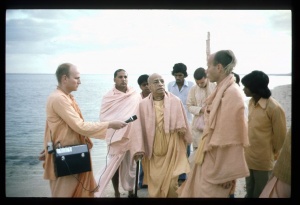SB 11.21.2

A.C. Bhaktivedanta Swami Prabhupada
Please note: The synonyms, translation and purport of this verse were composed by disciples of Śrīla Prabhupāda
TEXT 2
- sve sve 'dhikāre yā niṣṭhā
- sa guṇaḥ parikīrtitaḥ
- viparyayas tu doṣaḥ syād
- ubhayor eṣa niścayaḥ
SYNONYMS
sve sve — each in his own; adhikāre — position; yā — such; niṣṭhā — steadiness; saḥ — this; guṇaḥ — piety; parikīrtitaḥ — is declared to be; viparyayaḥ — the opposite; tu — indeed; doṣaḥ — impiety; syāt — is; ubhayoḥ — of the two; eṣaḥ — this; niścayaḥ — the definite conclusion.
Translation and purport composed by disciples of Śrīla Prabhupāda
TRANSLATION
Steadiness in one's own position is declared to be actual piety, whereas deviation from one's position is considered impiety. In this way the two are definitely ascertained.
PURPORT
In the previous verse Lord Kṛṣṇa explained that the path of spiritual progress begins with working without fruitive desires, advances to the stage of realized spiritual knowledge, and culminates in direct engagement in the devotional service of the Lord. Here the Lord emphasizes that a conditioned soul should not artificially disrupt the natural evolution of his Kṛṣṇa consciousness by deviating from those duties prescribed by the Lord Himself. In the lower stages of human life one is entangled in false identification with the gross material body and desires to execute material fruitive activities based on society, friendship and love. When such materialistic activities are offered in sacrifice to the Supreme Lord, one becomes situated in karma-yoga. By regulated sacrifice one gradually gives up the gross bodily concept of life and advances to the stage of realization of spiritual knowledge, whereby one understands oneself to be an eternal spirit soul completely different from the material body and mind. Feeling relief from the pangs of materialism one becomes very attached to one's spiritual knowledge, and thus one is situated in the stage of jñāna-yoga. As the candidate further advances on the spiritual path, he understands himself to be part and parcel of the Supreme Soul, the Personality of Godhead, Lord Kṛṣṇa. He then sees that his conditional life as well as his spiritual knowledge was obtained from the Personality of Godhead, who awards the results of all types of activities, both pious and sinful. By directly engaging in the loving service of the Supreme Lord and understanding oneself to be the Lord's eternal servant, one's attachment evolves into pure love of Godhead. Thus one first gives up the lower stage of attachment to the material body and then subsequently gives up attachment to cultivation of spiritual knowledge. This relieves one of material life. Finally one recognizes the Lord Himself as the resting place of one's eternal love and fully surrenders to God in full Kṛṣṇa consciousness.
Lord Kṛṣṇa explains in this verse that one who is still attached to the material body and mind cannot artificially give up the prescribed duties of karma-yoga. In the same way, one who is a spiritual neophyte, just beginning to realize the illusion of material life, should not artificially try to think of the Lord's intimate pastimes twenty-four hours a day, imitating the stage of prema-bhakti. Rather, he should cultivate analytic knowledge of the material world, by which one gives up attachment to the material body and mind. In Śrīmad-Bhāgavatam we find many analytic descriptions of the material world, and they can free the conditioned soul from false identification with matter. One who has achieved the perfect stage of love of Godhead, however, being freed from all gross and subtle attachments to the material world, may give up the lower stages of karma-yoga and jñāna-yoga and engage directly in the Lord's loving service.
In Chapter Nineteen, verse 45, Lord Kṛṣṇa states, guṇa-doṣa-dṛśir doṣo guṇas tūbhaya-varjitaḥ. One should not see material good and evil within a devotee of the Lord. Indeed, one becomes pious by giving up such mundane conceptions. Śrīla Viśvanātha Cakravartī Ṭhākura points out that occasionally a neophyte devotee may be polluted by association with those enthusiastically executing fruitive activities and mental speculation. Such a devotee's religious activities may be affected by mundane tendencies. Similarly, an ordinary person who observes the exalted status of a pure devotee sometimes externally imitates the devotee's activities, considering himself to be on the same exalted platform of pure devotional service. These imperfect practitioners of bhakti-yoga are not exempt from criticism, since their fruitive activities, mental speculation and false prestige are material intrusions in the pure loving service of the Lord. A pure devotee engaged exclusively in the Lord's service should not be criticized, but a devotee whose devotional service is mixed with material qualities may be corrected so that he can rise to the platform of pure devotional service. Innocent persons should not be misled by the mixed devotional service of those not engaged exclusively in the bhakti-yoga system, but those unable to fully engage in Kṛṣṇa consciousness should nevertheless not give up their regular prescribed duties, declaring them to be illusion. For example, one unable to fully engage in pure Kṛṣṇa consciousness should not give up his family, considering it an illusion, for by doing so he will fall into illicit sex life. Material piety and analytic knowledge of the material world must therefore be cultivated until one comes to the stage of directly practicing Kṛṣṇa consciousness.